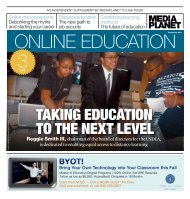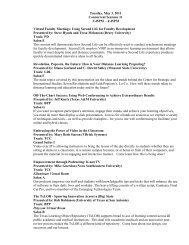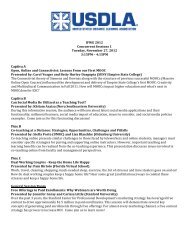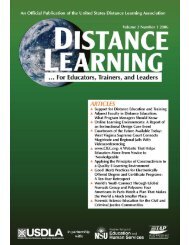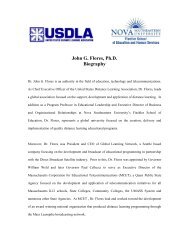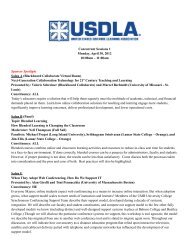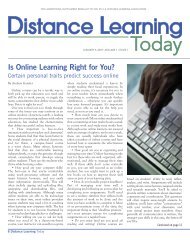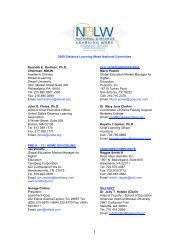United States Distance Learning Association
United States Distance Learning Association
United States Distance Learning Association
- No tags were found...
Create successful ePaper yourself
Turn your PDF publications into a flip-book with our unique Google optimized e-Paper software.
2004; The Quality Assurance Agency for<br />
Higher Education, 1999; Western Cooperative<br />
for Educational Telecommunications<br />
Project, 2003). A review of the published<br />
standards reveals a high degree of congruence<br />
among them (Twigg, 2001b). A successful<br />
education is associated with a<br />
number of factors. The quality of the learning<br />
experience, and the expectations that<br />
learners bring to the table are among the<br />
most important ones (Rooney et al., 2006).<br />
The present article focuses on providing<br />
perceptions of quality in distance education<br />
from the perspective of faculty, students,<br />
and administrators. The setting of<br />
this report is three institutions of higher<br />
education that have embraced distance<br />
education. Two representatives from each<br />
constituency were interviewed on their<br />
perceptions of quality in distance education,<br />
with a focus on building relationships,<br />
feedback, and the future of distance<br />
education. This article is relevant for educators<br />
and administrators interested in<br />
understanding quality in distance education<br />
at their institutions.<br />
DIFFUSION OF INNOVATIONS<br />
The theory of diffusion of innovations<br />
(Rogers, 1962), provides the foundation for<br />
understanding adoption cycles and provides<br />
the labels to describe the population.<br />
“Adopter categories are the classifications<br />
of the members of a social system” (Rogers,<br />
2003, p. 297).<br />
ROGERS’S ADOPTER CATEGORIES<br />
Rogers (2003) uses five categories: innovators,<br />
early adopters, early majority, late<br />
majority, and laggards.<br />
INNOVATORS<br />
Innovators are obsessed by innovations.<br />
They tend to be risk takers and are able to<br />
adapt and cope with innovations. This<br />
attribute requires innovators to have the<br />
Noteh Glogauer, Principal,<br />
Kesser Torah College, Sydney, Australia.<br />
Telephone: +61 2 9388 2600, Ext 108.<br />
E-mail: rabbinoteh@glogauer.com<br />
Diane Hobson, Technology Instructor,<br />
Trimble Middle School, 18500 Jacksonville<br />
Road, Glouster, OH 45732.<br />
Telephone: (740) 767-4277.<br />
E-mail: tl_dhobson@seovec.org<br />
20 <strong>Distance</strong> <strong>Learning</strong> Volume 4, Issue 4



